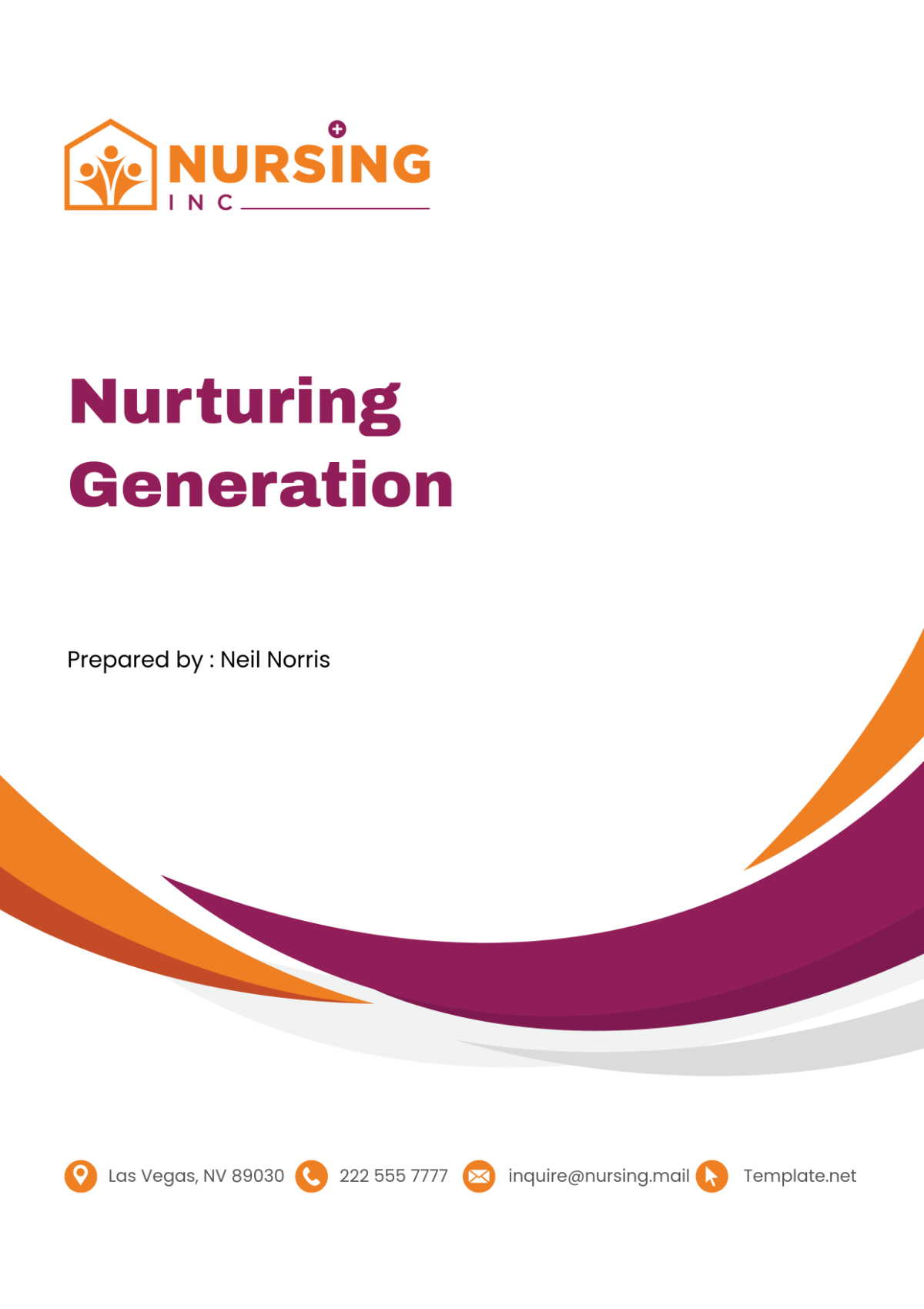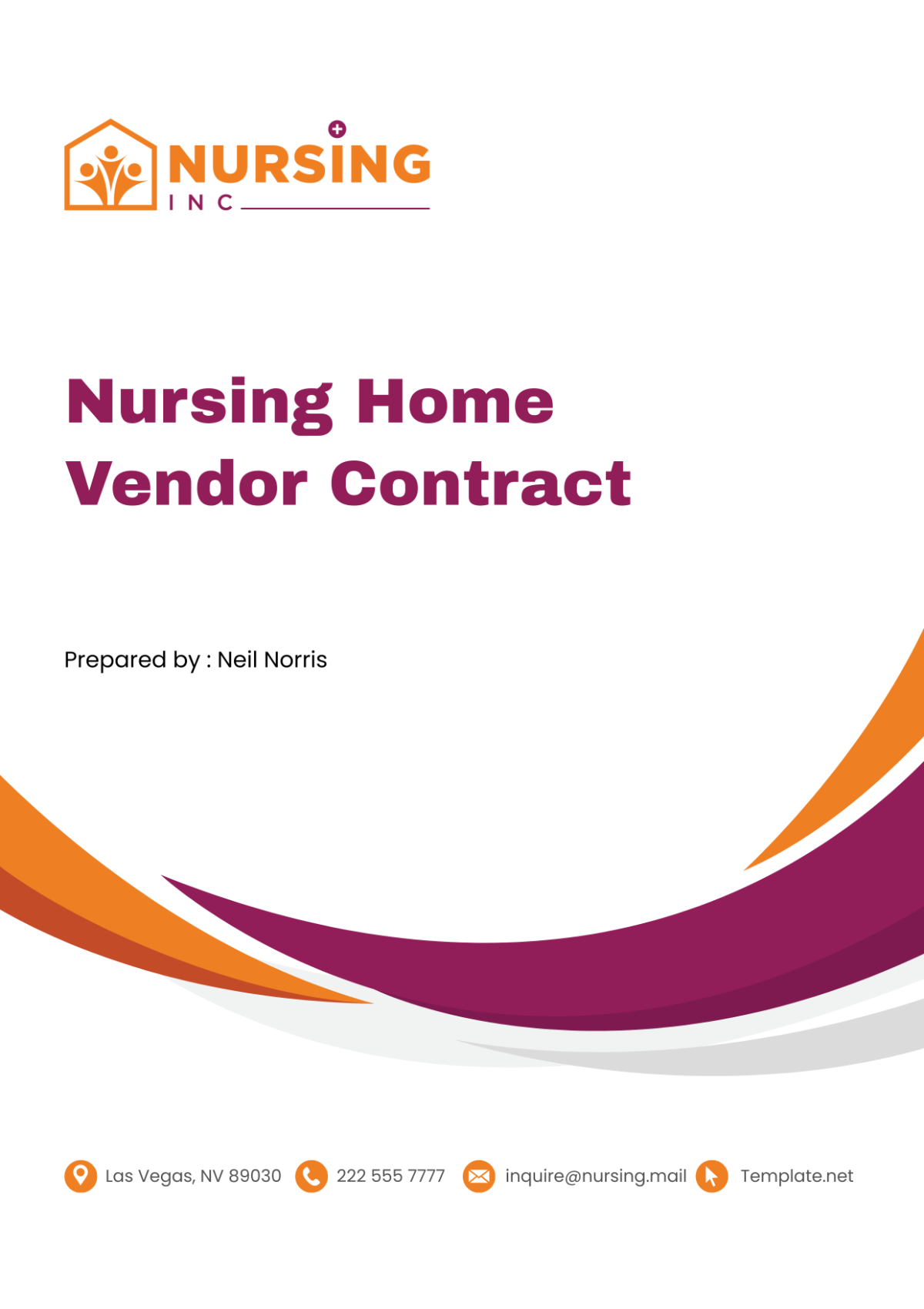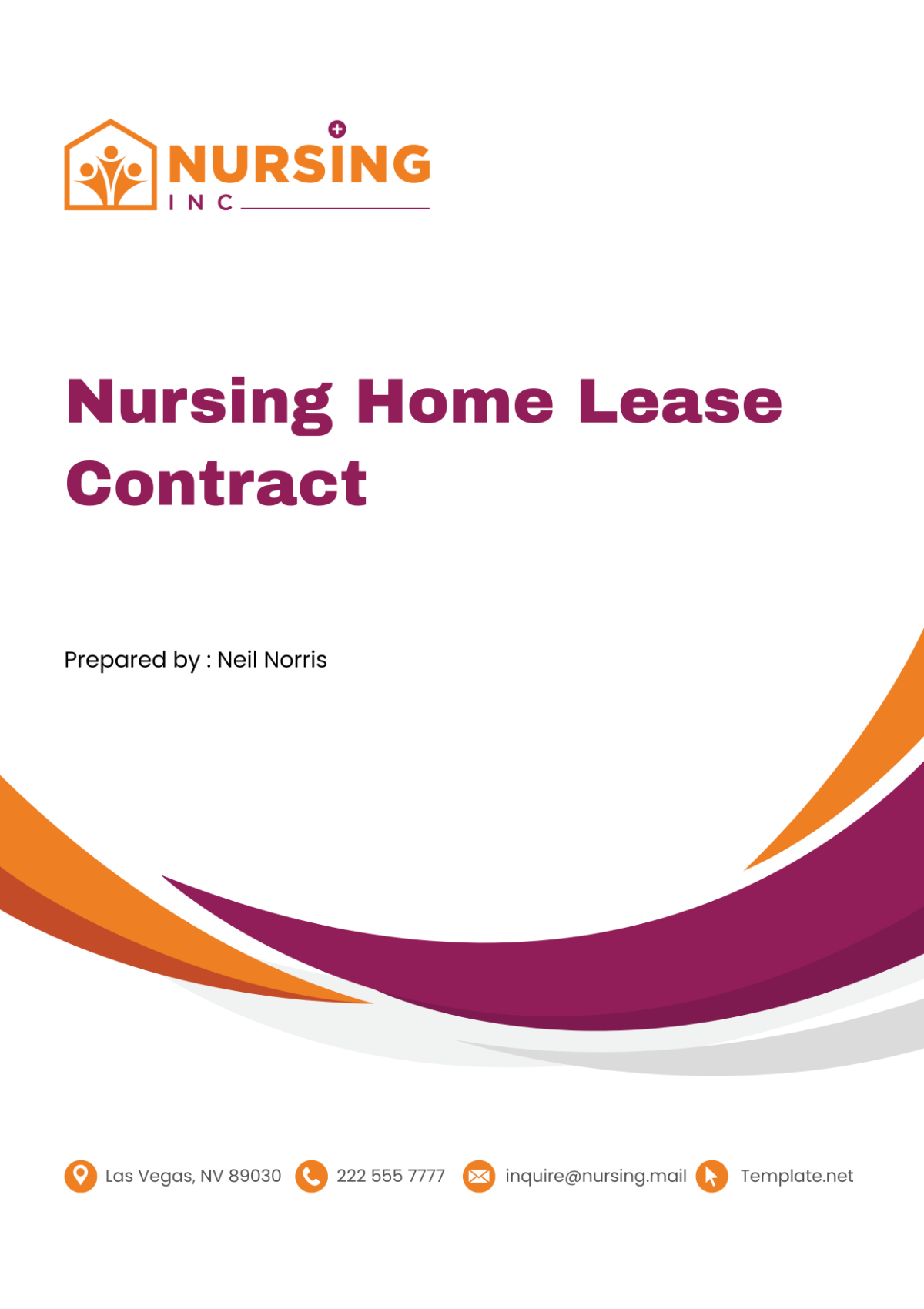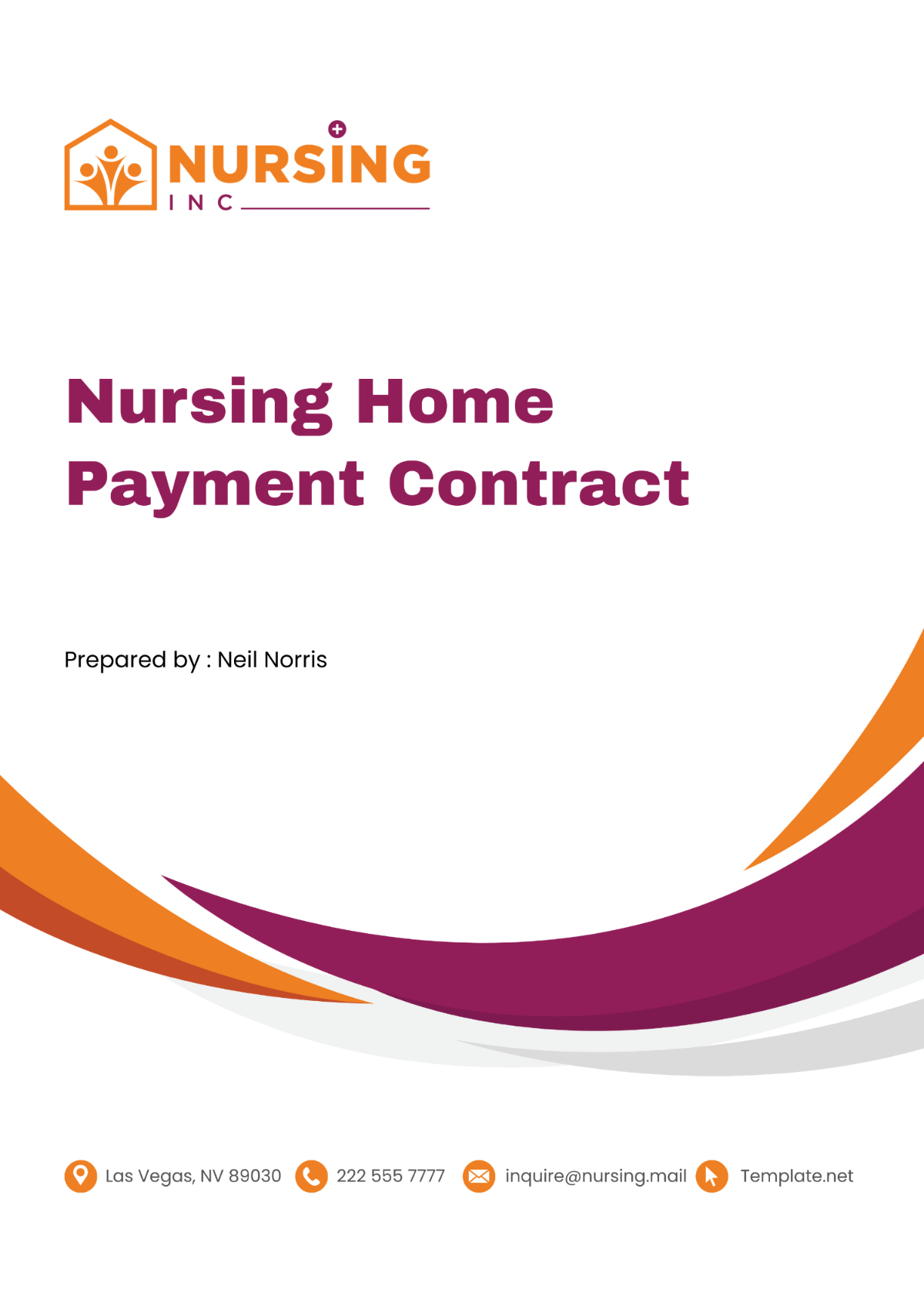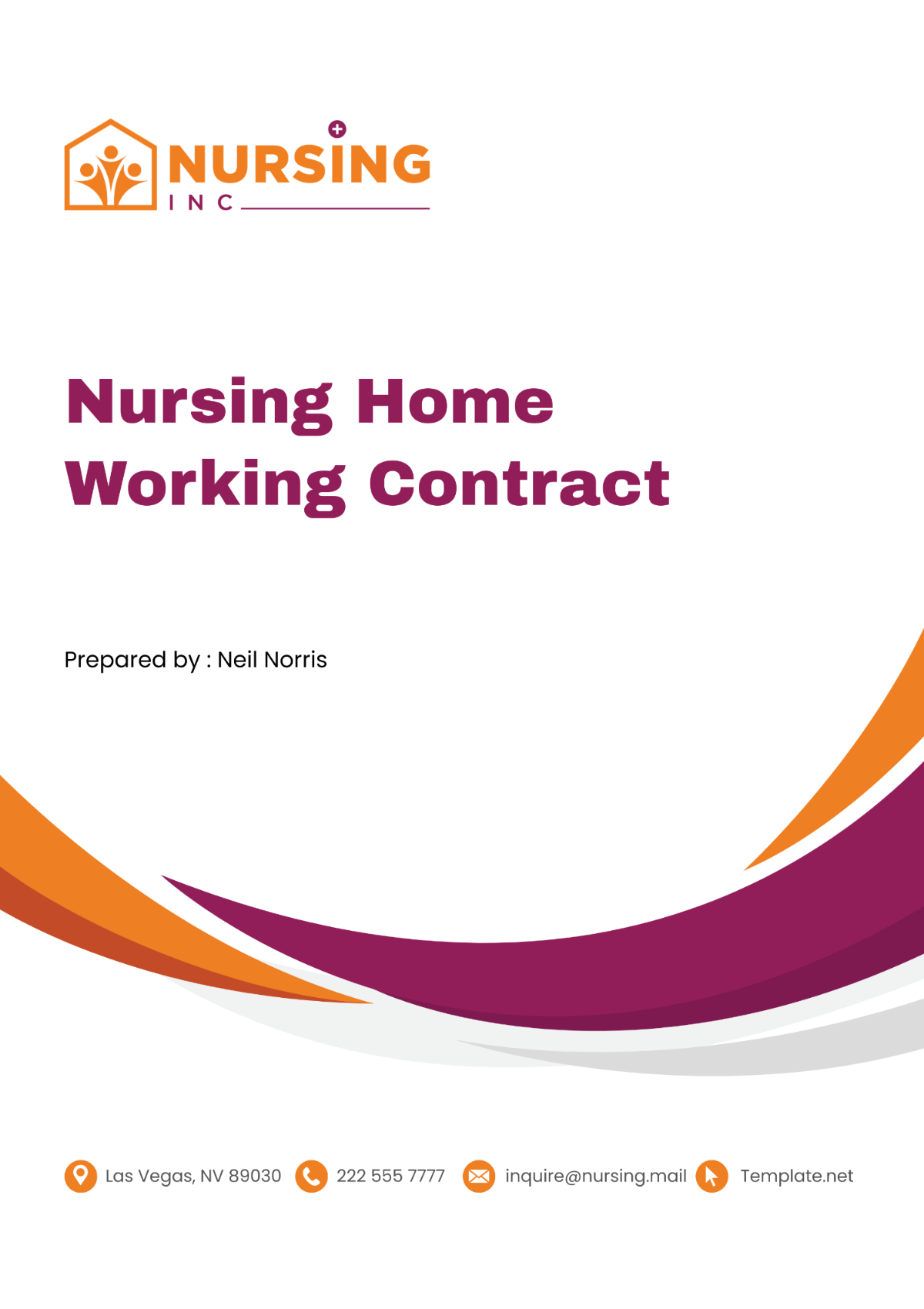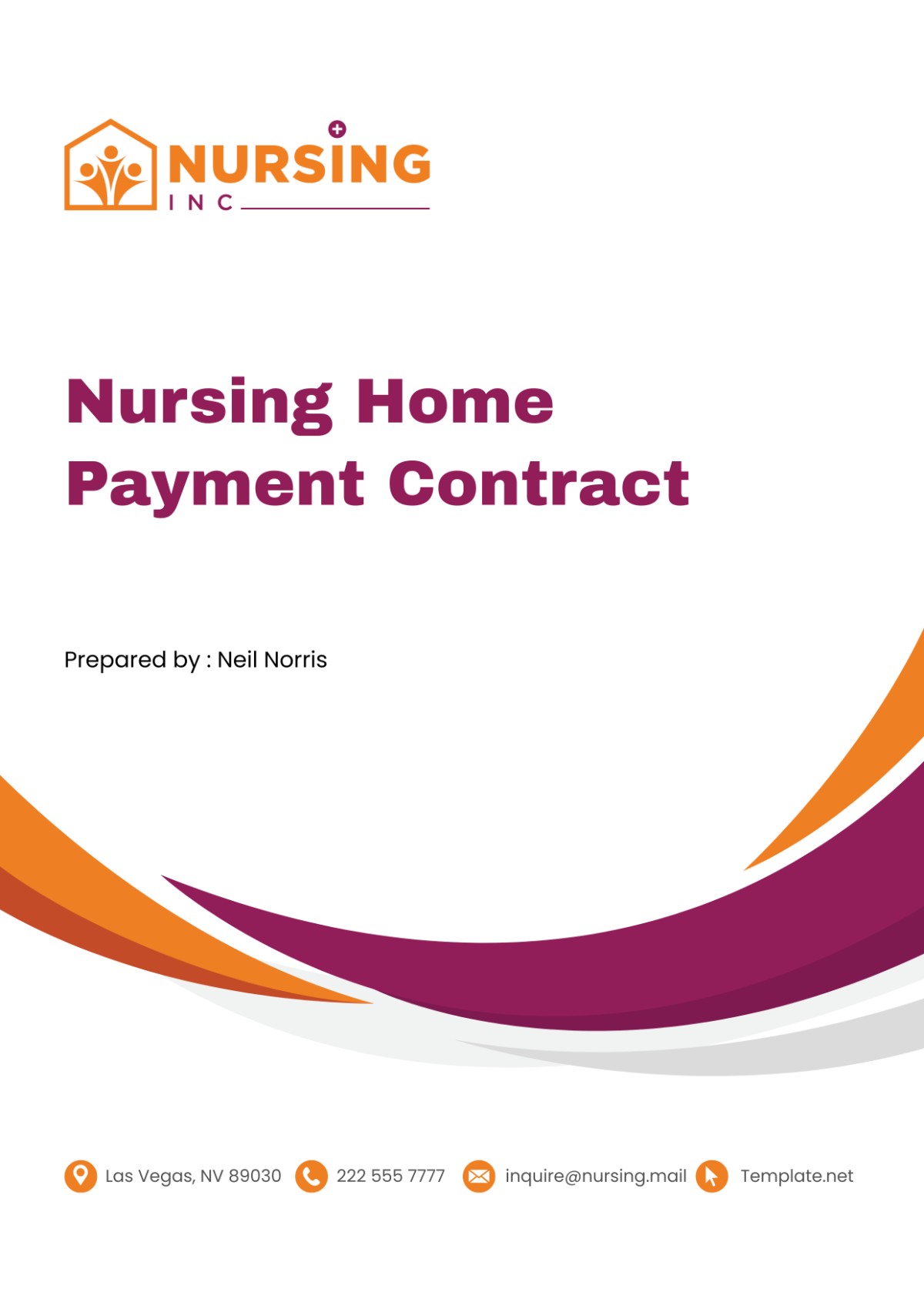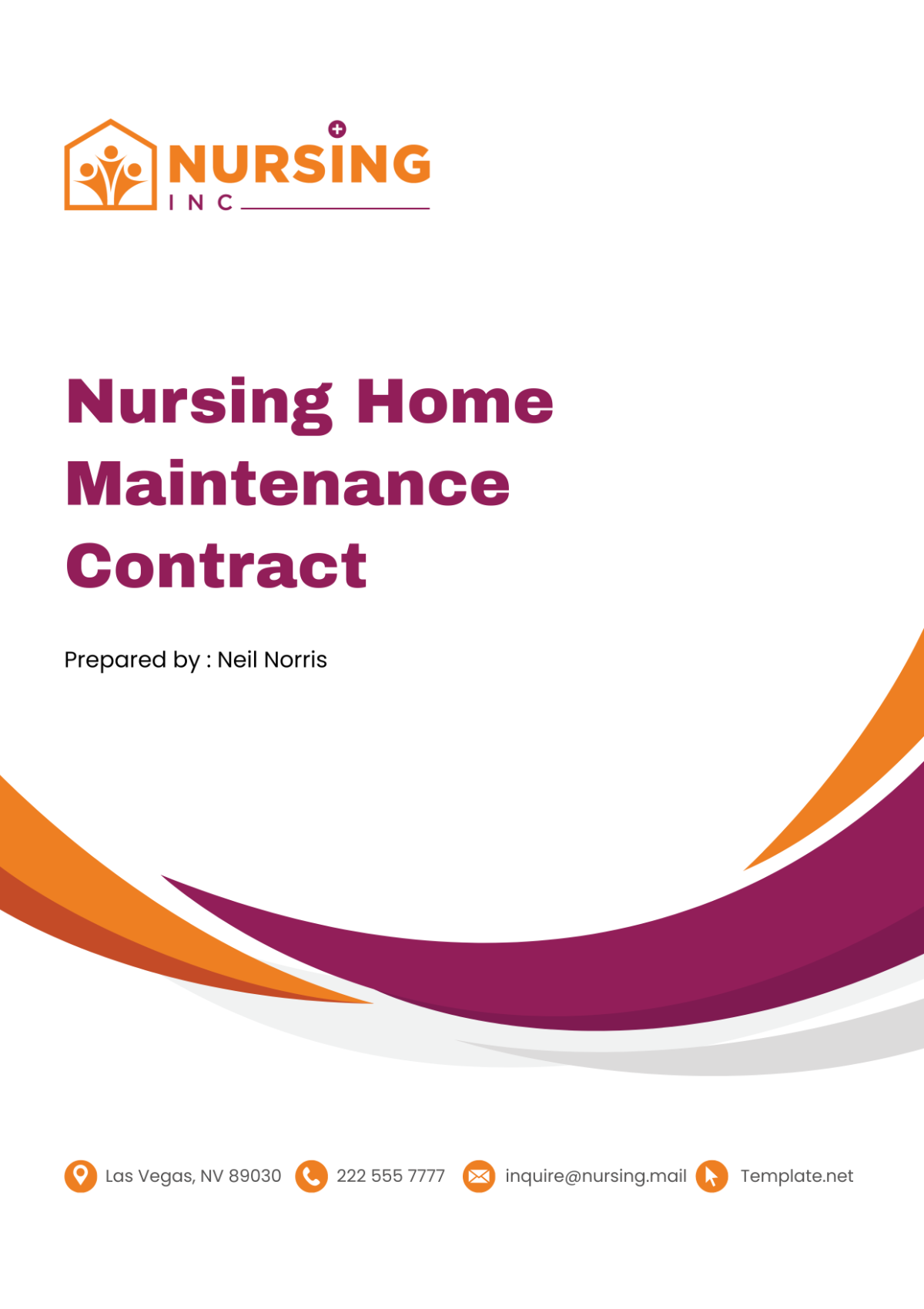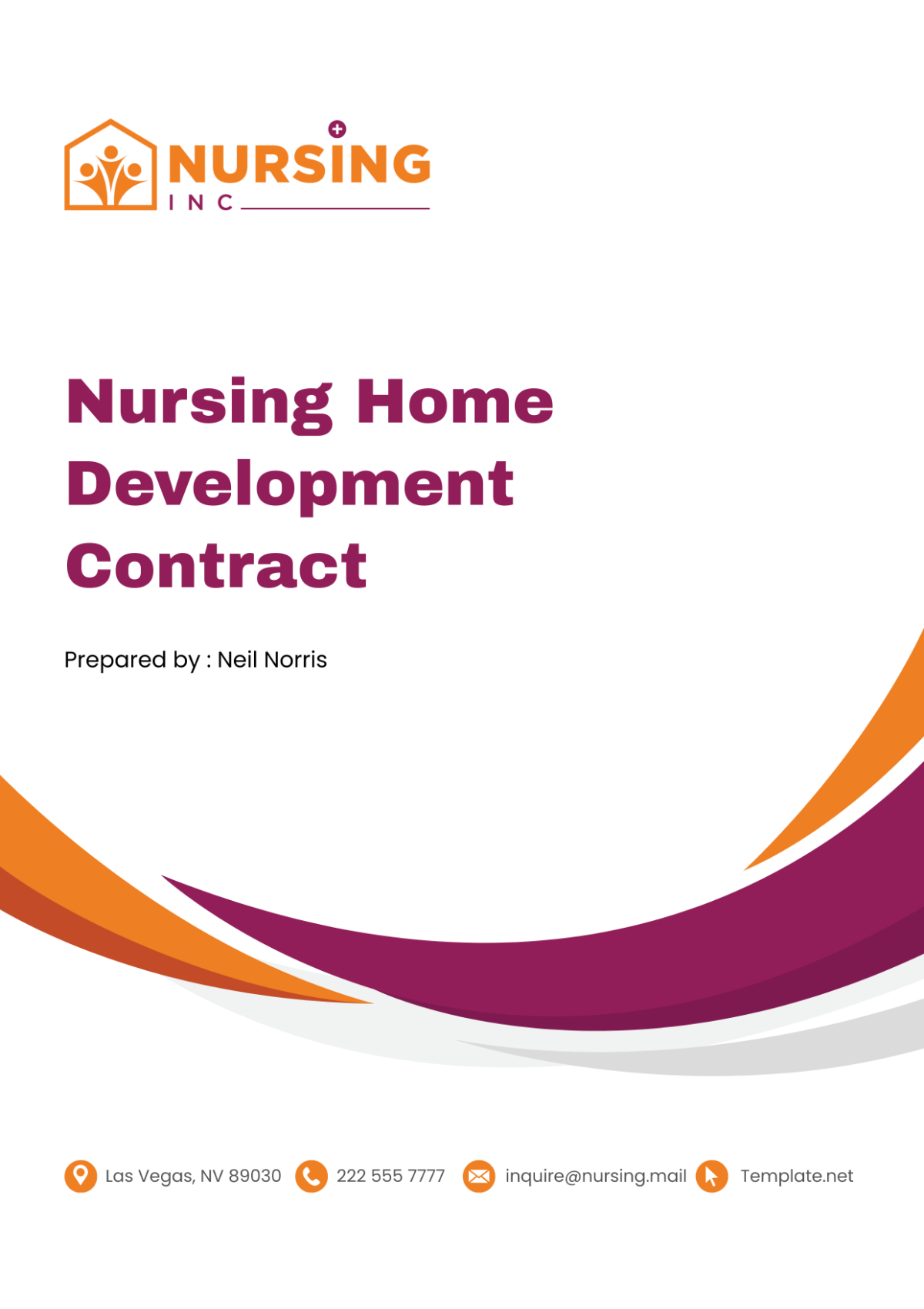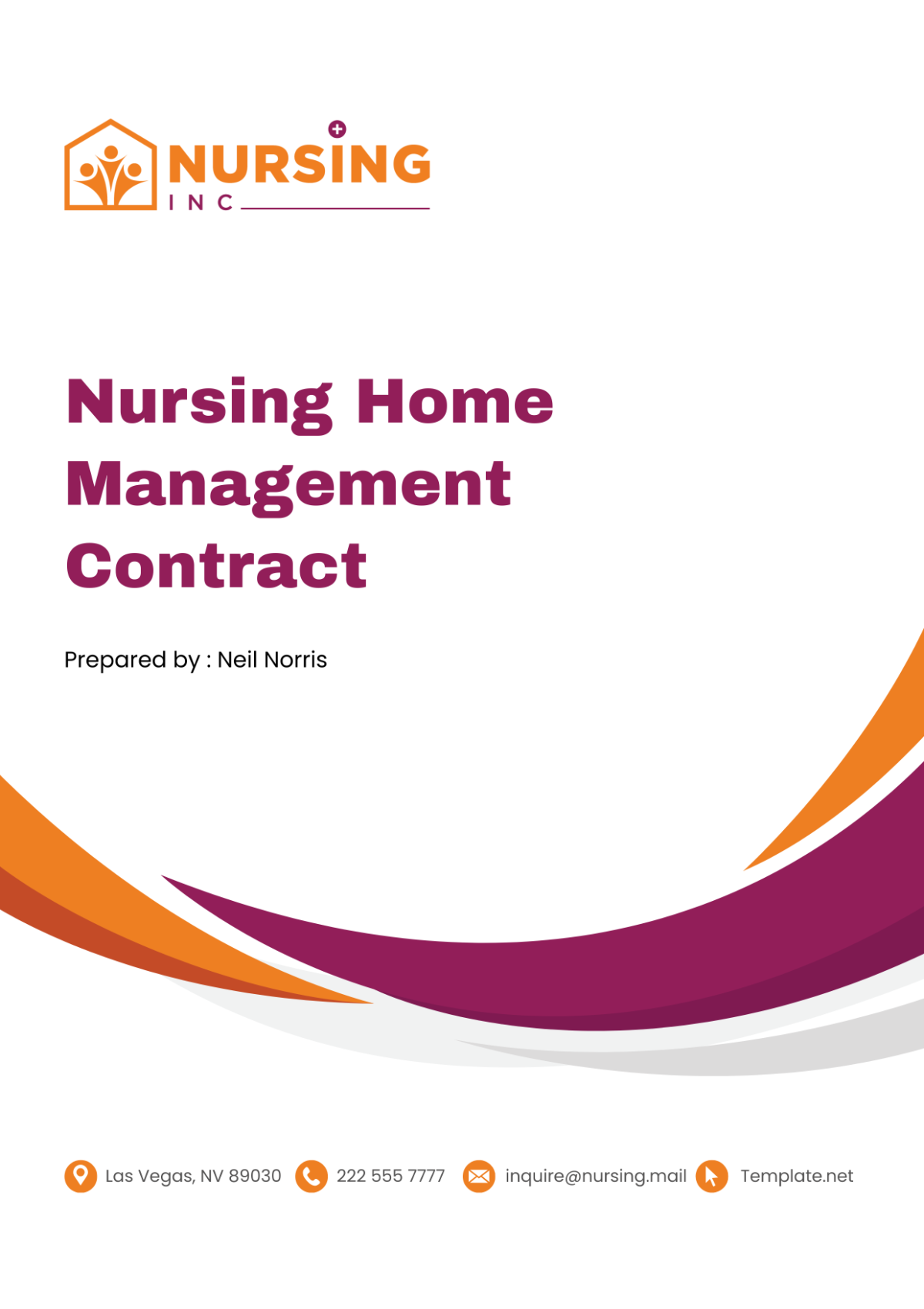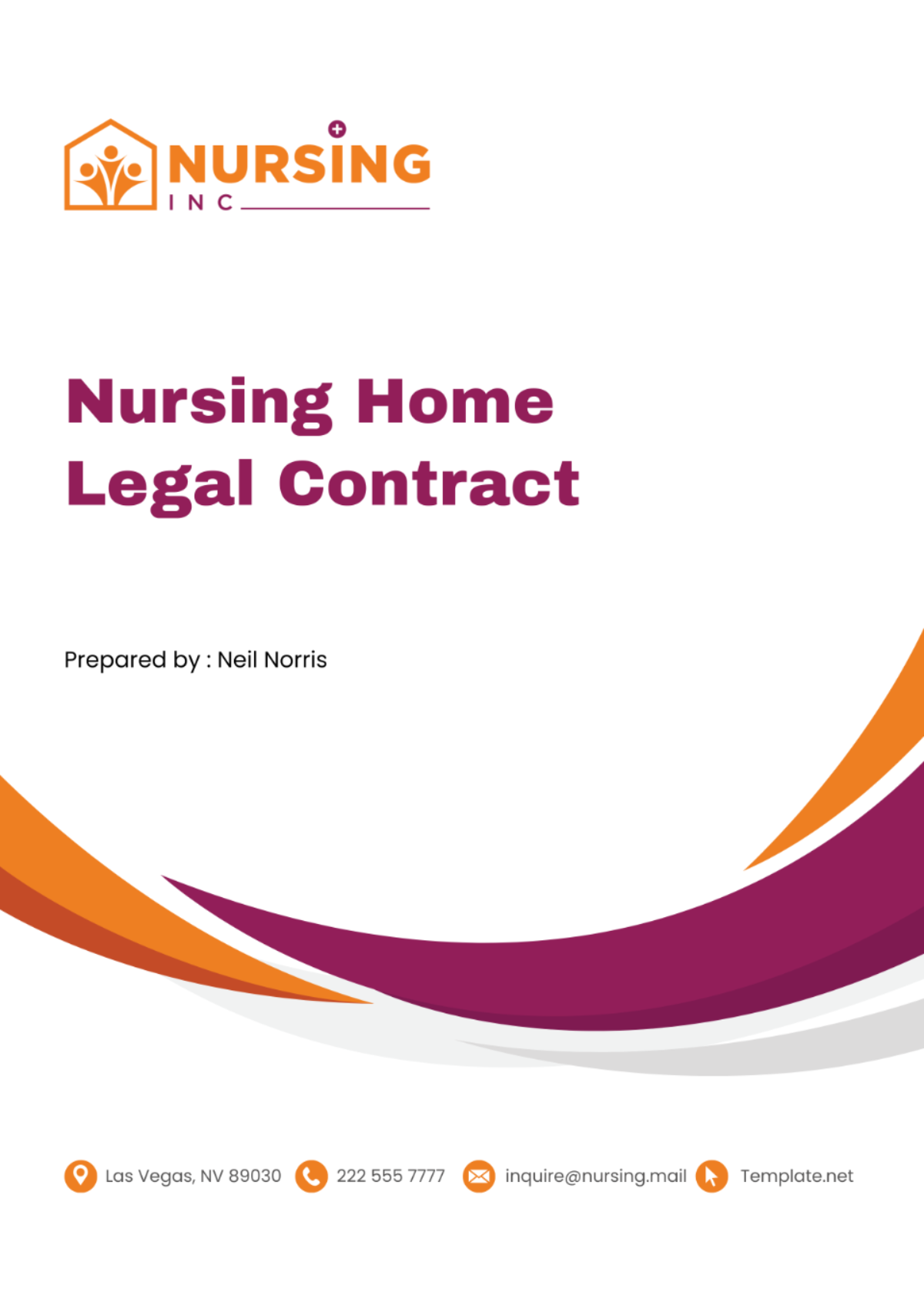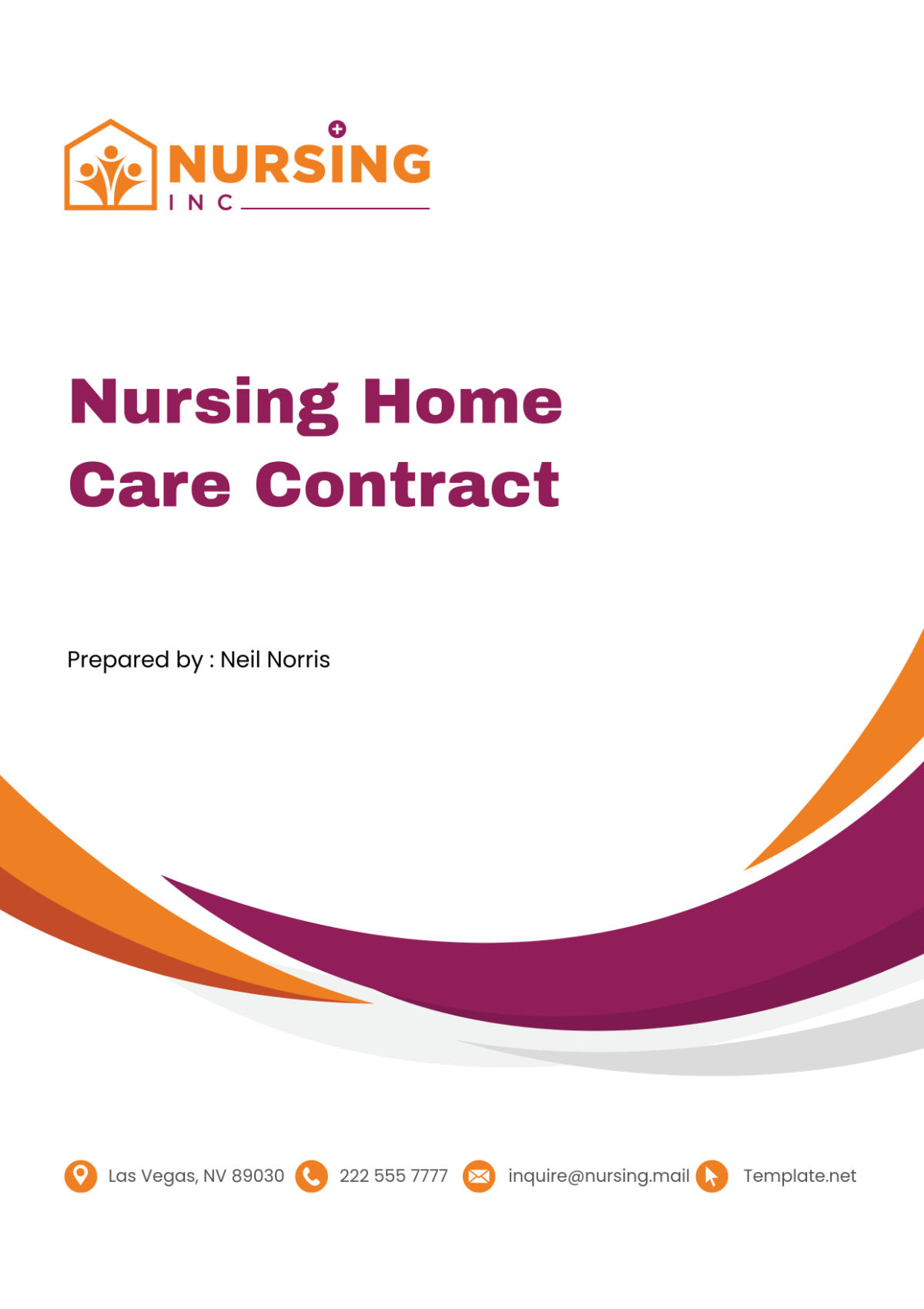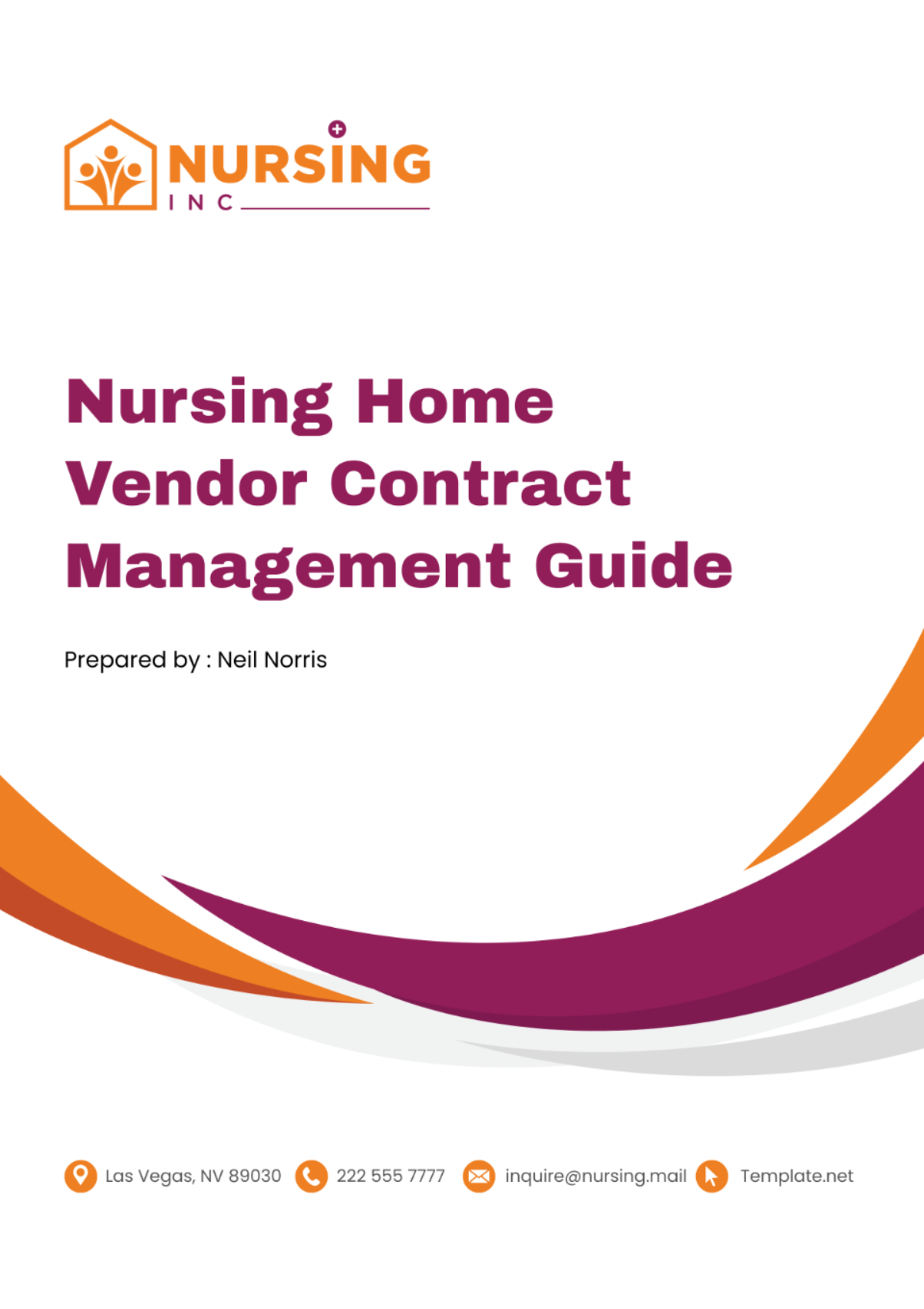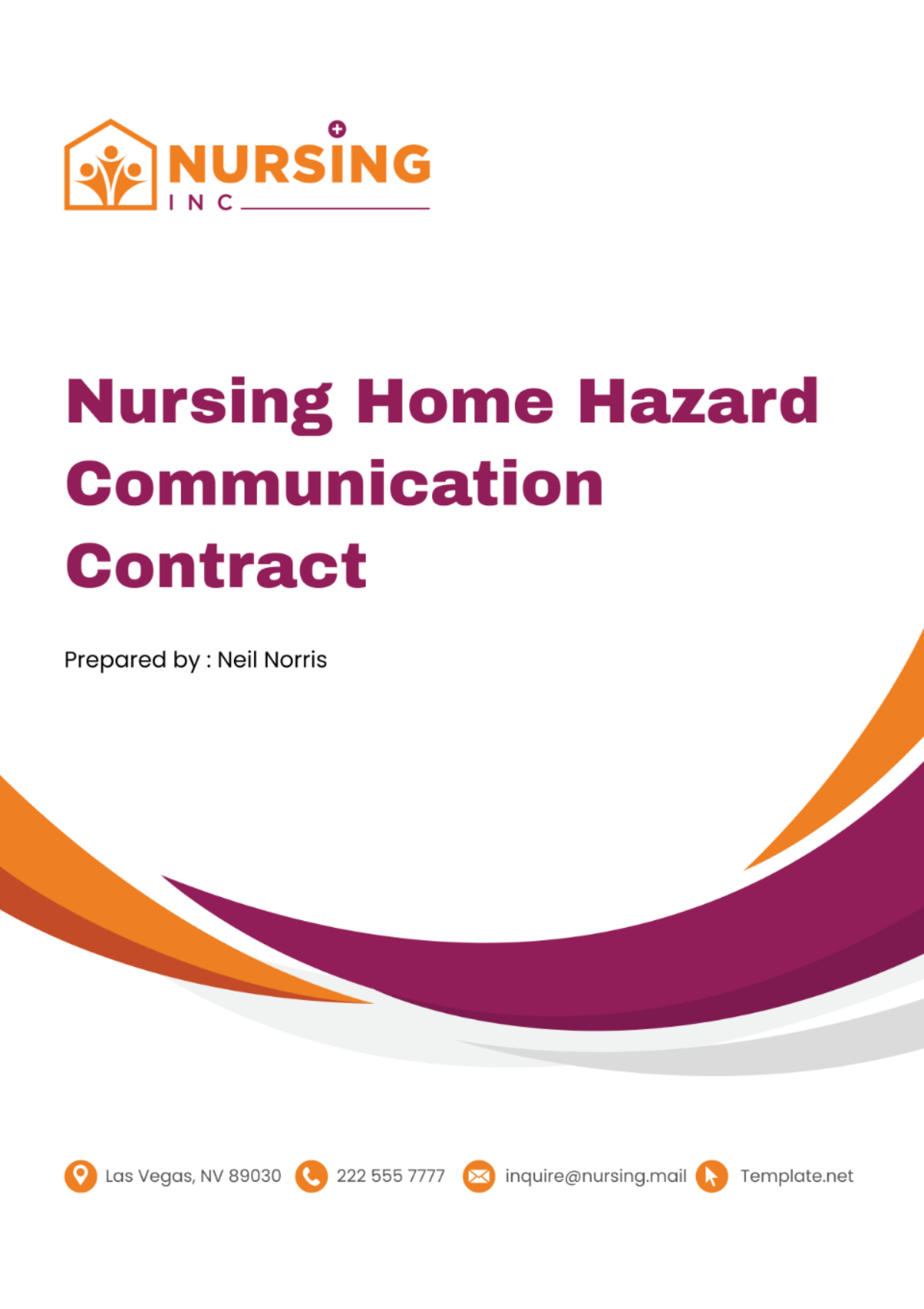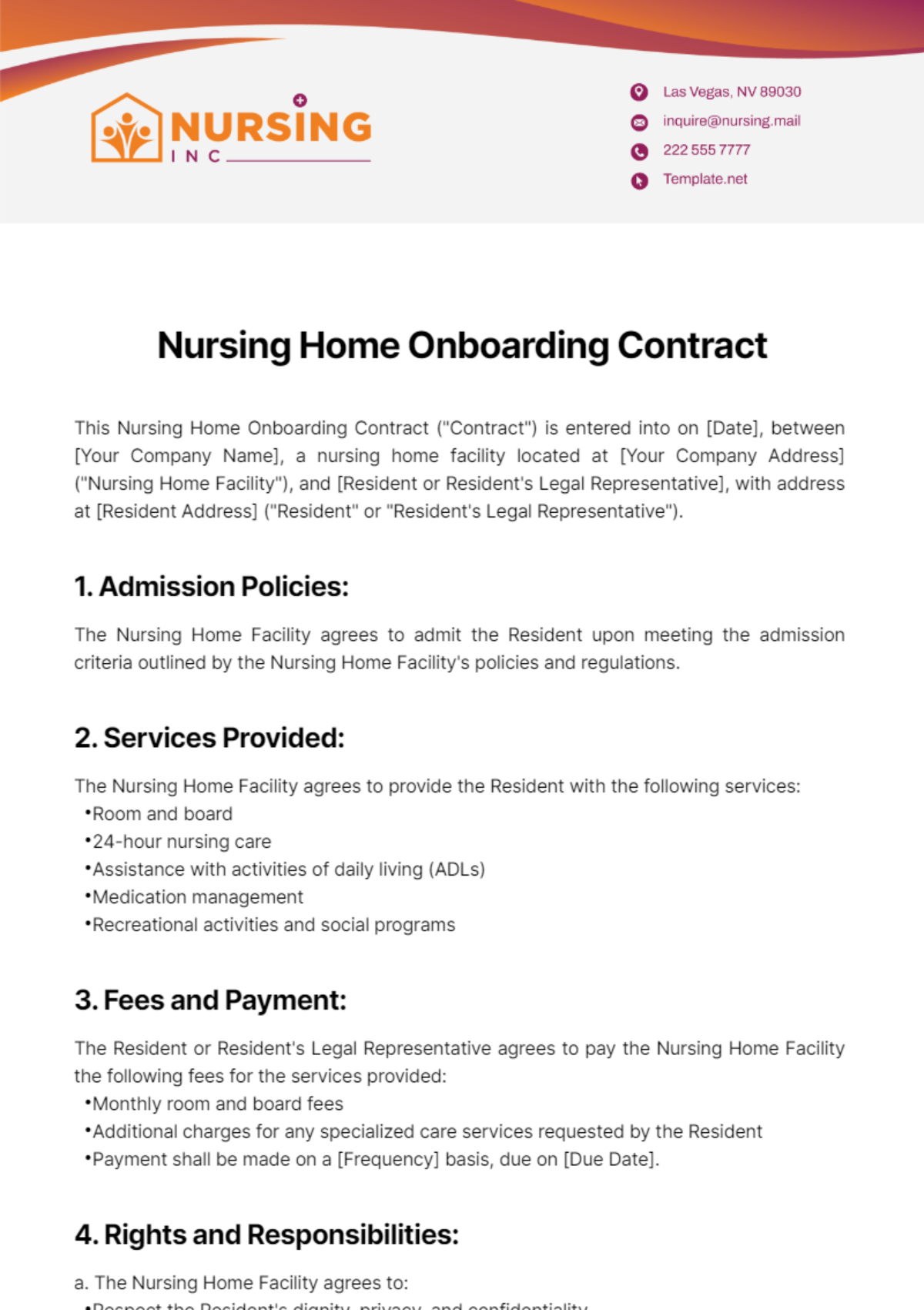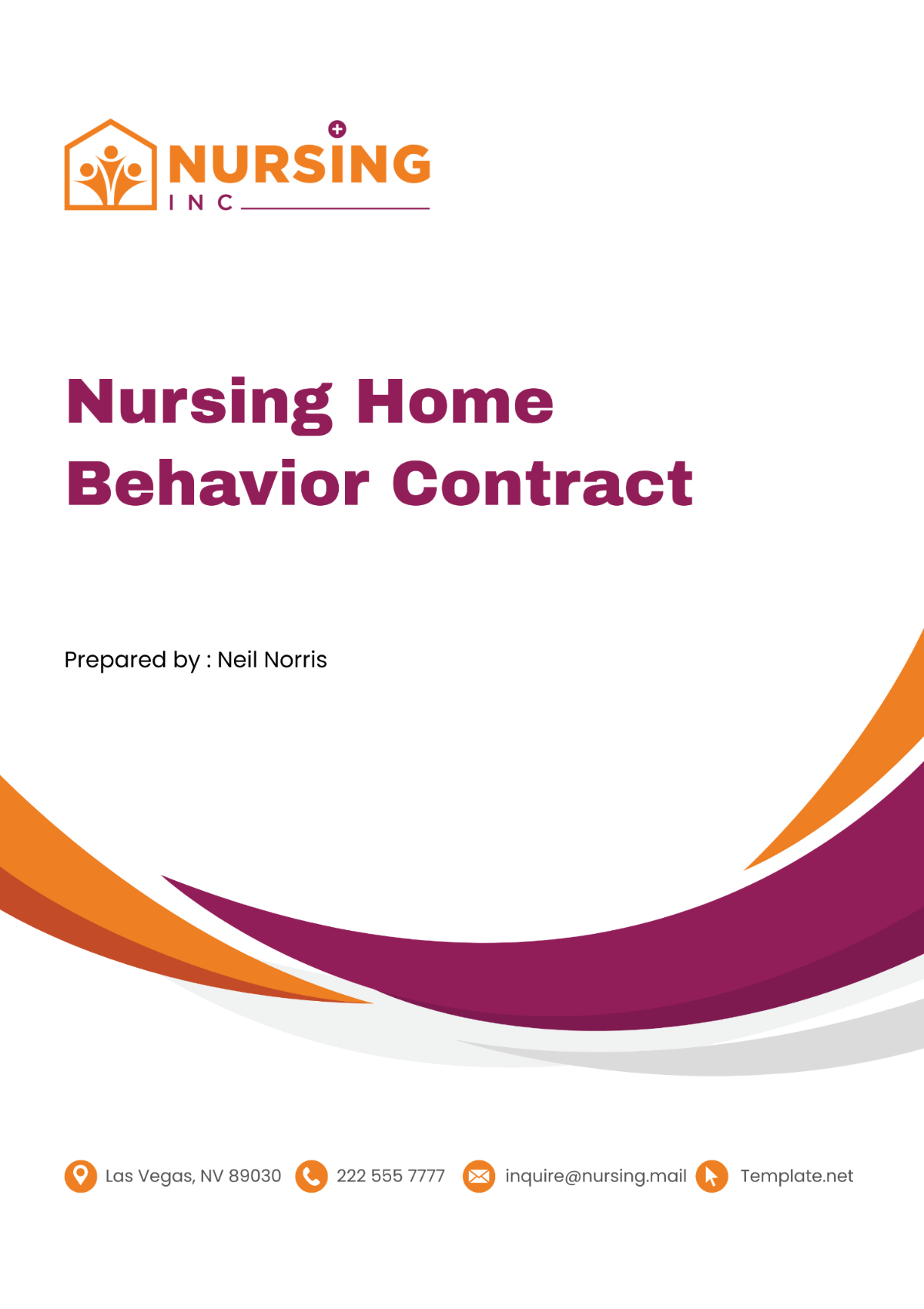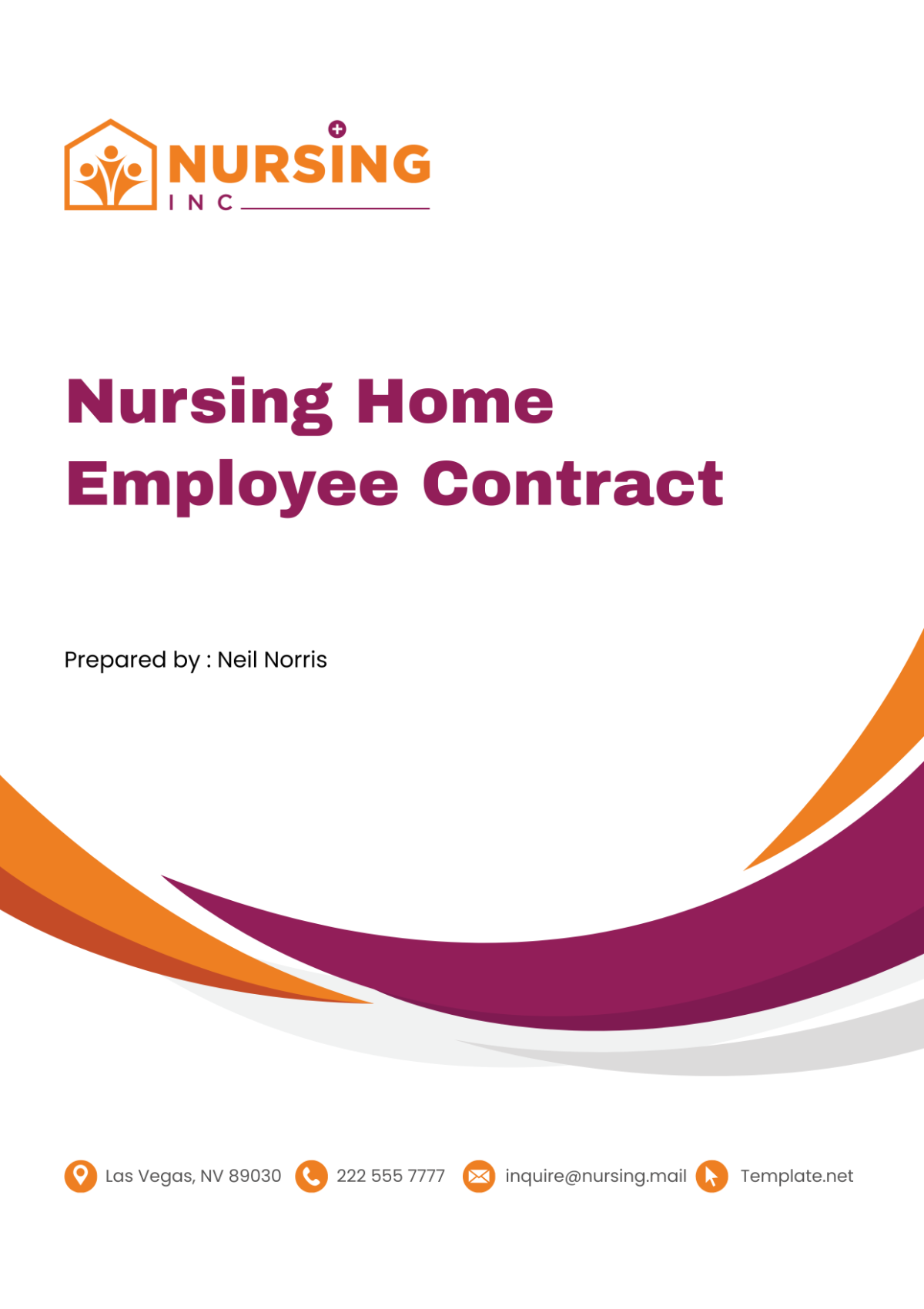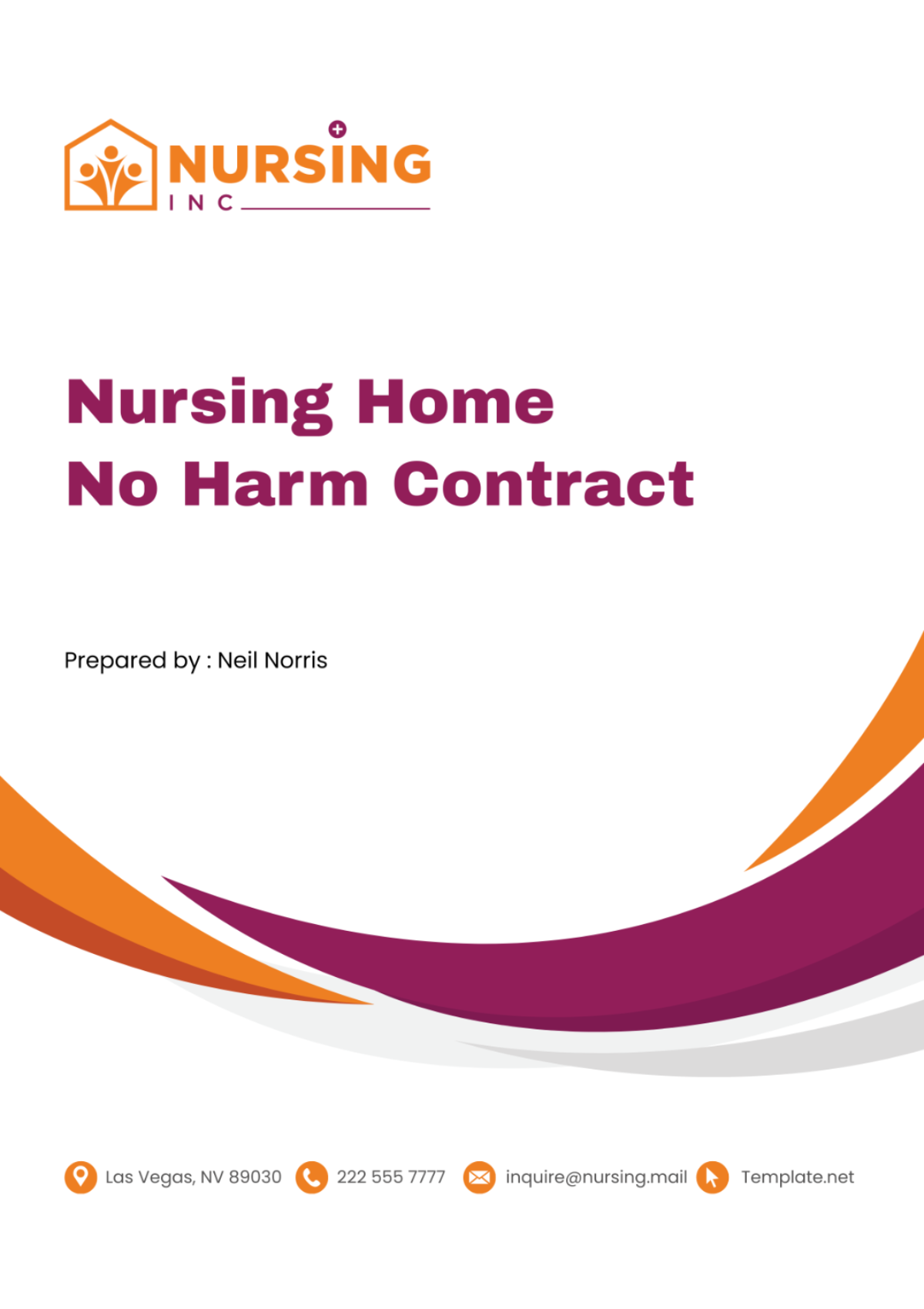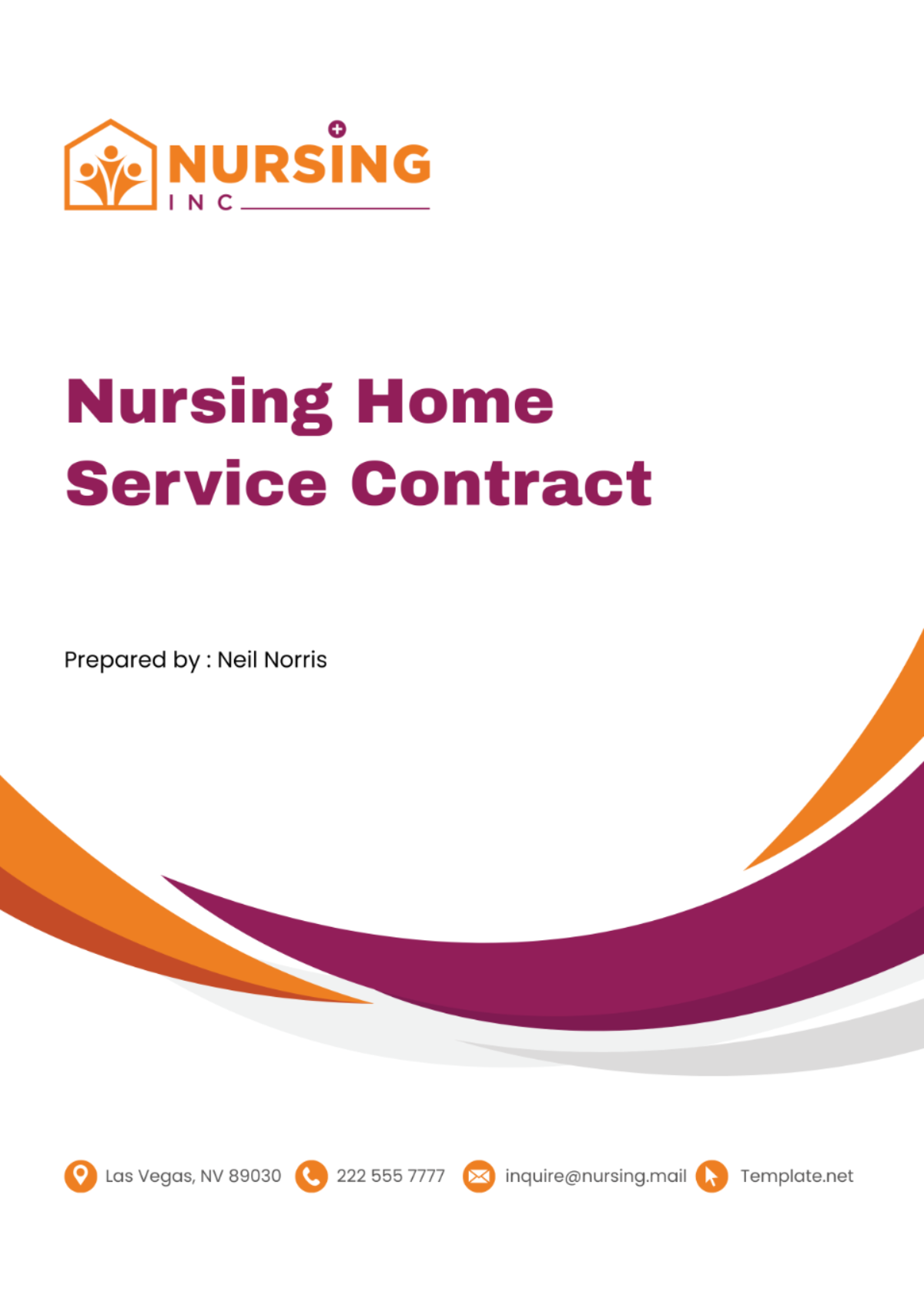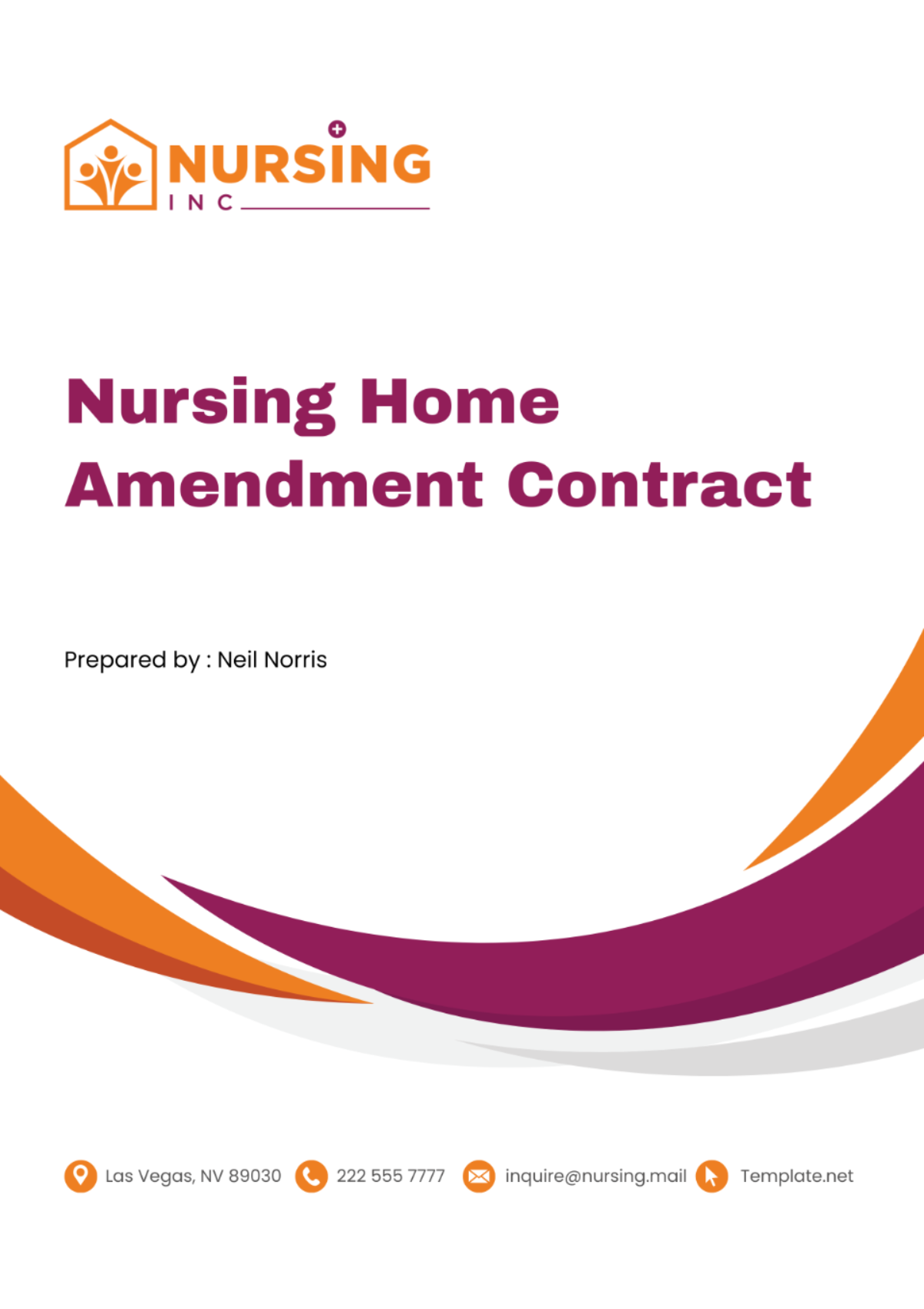Nursing Home Payment Contract
I. The Parties
This Nursing Home Payment Contract ("Contract") is entered into on [Month Day, Year] ("Effective Date") by and between [Your Company Name], located at [Your Company Address], hereinafter referred to as the ("Nursing Home"), and [Resident's Name], located at [Resident's Address], hereinafter referred to as the ("Resident") collectively referred to as the ("Parties").
WHEREAS, the Nursing Home is a reputable provider of nursing home services, committed to providing high-quality care and support to its residents;
WHEREAS, the Resident is in need of nursing home services and wishes to receive these services from the Nursing Home;
WHEREAS, the Parties wish to set forth in writing the terms and conditions under which the Nursing Home will provide services to the Resident;
NOW, THEREFORE, in consideration of the mutual covenants contained herein and for other good and valuable consideration, the receipt and sufficiency of which is hereby acknowledged, the Parties agree as follows:
II. Services to be Provided
A. Comprehensive Care
Holistic Approach: As a nursing home, we are committed to providing comprehensive care that addresses the physical, emotional, and social needs of the Resident. We believe in a holistic approach to care that considers the whole person, not just their medical needs.
Individualized Care Plan: We will develop an individualized care plan for the Resident, taking into account their unique needs, preferences, and goals. This care plan will be reviewed and updated regularly to ensure it remains relevant and effective.
Interdisciplinary Team: Our care team includes professionals from various disciplines, including nursing, physical therapy, occupational therapy, social work, and nutrition. This interdisciplinary approach ensures that all aspects of the Resident’s health and well-being are addressed.
Family Involvement: We encourage the involvement of family members in the care of the Resident. We believe that family involvement enhances the quality of care and contributes to the well-being of the Resident.
Continuous Improvement: We are committed to continuous improvement and will regularly evaluate our services to identify areas for improvement.
B. Specific Services
Meal Services: We will provide nutritious and balanced meals that cater to the dietary needs and preferences of the Resident. Our meal services include regular meals, snacks, and special diets as prescribed by a doctor or dietitian.
Medication Management: We will manage the medication needs of the Resident, ensuring that they receive the right medication at the right time. Our medication management services include medication administration, medication monitoring, and coordination with healthcare providers.
Personal Care: We will provide personal care services to assist the Resident with activities of daily living, such as bathing, dressing, toileting, and eating. Our staff is trained to provide these services in a respectful and dignified manner.
Recreation Activities: We will provide a variety of recreation activities to promote the physical, mental, and social well-being of the Resident. These activities may include exercise classes, arts and crafts, games, social events, and outings.
III. Term of Contract
A. Notice of Termination
Termination by Either Party: Either Party can end this Agreement by giving written notice to the other Party. This ensures that both the Nursing Home and the Resident have the flexibility to end the Agreement if circumstances change.
Notice Period: The notice period will be defined in the Agreement to ensure a smooth transition of care for the Resident. This could range from a few weeks to several months, depending on what is deemed appropriate for the specific situation.
Written Notice: The notice must be in writing and should clearly state the intention to terminate the Agreement. This provides a clear record of the decision to terminate and helps to avoid any misunderstandings.
Receipt of Notice: The Party receiving the notice should acknowledge receipt in writing. This ensures that both Parties are aware of the impending termination of the Agreement.
B. Conditions for Termination
Breach of Contract: The Agreement can be terminated if either Party breaches the terms of the Contract. This could include failure to provide the agreed-upon services, violation of the Resident’s rights, or any other breach of the terms set out in the Agreement.
Failure to Pay: If the Resident fails to pay the fees as outlined in the Agreement, the Nursing Home may have the right to terminate the Agreement. However, the Nursing Home will typically provide a grace period and make efforts to resolve the issue before proceeding to termination.
Changes in Care Needs: If the Resident’s care needs change significantly, such that the Nursing Home is no longer able to provide appropriate care, the Agreement may be terminated. In such cases, the Nursing Home will usually assist the Resident in finding a more suitable care arrangement.
IV. Payment
A. Payment Agreement
Monthly Payment: The Resident agrees to pay the Nursing Home the sum of [$2,500] each month. This monthly payment is for the comprehensive care services provided by the Nursing Home.
Payment Date: The payment shall be made on or before the 5th day of each calendar month. This ensures that the Nursing Home has the necessary funds to provide the agreed-upon services.
Payment Method: The Resident can make the payment through various methods such as check, bank transfer, or credit card. The preferred method of payment can be discussed and agreed upon by both Parties.
Receipt of Payment: Upon receiving the payment, the Nursing Home will provide the Resident with a receipt. This serves as a record of the payment and can be used for tax or other purposes.
Payment Queries: If the Resident has any queries or concerns about the payment, they can contact the Nursing Home’s finance department. We are committed to resolving any payment issues promptly and efficiently.
B. Late Payments
Late Payment Fee: If the Resident fails to make the payment by the due date, late payments will accrue interest at a rate of [1.5%] per month. This is to encourage timely payments and to cover the administrative costs associated with late payments.
Notification of Late Payment: If a payment is late, the Nursing Home will notify the Resident in writing. The notification will include the amount due, the due date, and the accrued interest.
Grace Period: The Nursing Home may provide a grace period of 10 days after the due date during which the Resident can make the payment without incurring the late payment fee.
Payment Plan: If the Resident is having difficulty making payments, the Nursing Home may agree to a payment plan. This would allow the Resident to make smaller, more manageable payments over a longer period of time.
V. Confidentiality
A. Agreement to Confidentiality
Commitment to Confidentiality: Both parties, the Nursing Home and the Resident, agree to maintain the confidentiality of all non-public information. This commitment is fundamental to the trust and respect that underpin our relationship with the Resident.
Scope of Confidential Information: Confidential information includes, but is not limited to, personal data, medical records, financial information, and any other information that is not publicly available. We understand the sensitive nature of this information and are committed to protecting it.
Use of Confidential Information: Confidential information will only be used for the purpose of providing care to the Resident and managing our relationship with the Resident. It will not be used for any other purpose without the explicit consent of the Resident.
Disclosure of Confidential Information: Confidential information will not be disclosed to any third party without the explicit consent of the Resident, except as required by law or in the case of a medical emergency.
Protection of Confidential Information: We have robust security measures in place to protect confidential information from unauthorized access, use, or disclosure. These measures include physical security, technological security, and administrative controls.
B. Breach of Confidentiality
Reporting a Breach: If either party becomes aware of a breach of confidentiality, they must report it to the other party immediately. This allows for prompt action to mitigate the impact of the breach.
Investigating a Breach: Upon receiving a report of a breach of confidentiality, we will conduct a thorough investigation to determine the cause of the breach, the extent of the information disclosed, and the potential impact on the Resident.
Mitigating a Breach: We will take immediate steps to mitigate the impact of a breach of confidentiality. This may include notifying affected individuals, reporting the breach to regulatory authorities, and taking steps to prevent further breaches.
Penalties for Breach: Breaches of confidentiality are serious violations of this Agreement and may result in disciplinary action, up to and including termination of the Agreement and legal action.
VI. Indemnification
A. Indemnification Agreement
Indemnification Obligation: The Resident shall indemnify and hold harmless the Nursing Home from any loss, claim, or damage caused by any act or omission by the Resident. This means that if the Nursing Home suffers any loss or damage as a result of the Resident’s actions, the Resident will compensate the Nursing Home for that loss or damage.
Scope of Indemnification: The indemnification covers any loss, claim, or damage that is directly or indirectly caused by the Resident’s actions. This includes, but is not limited to, damage to property, injury to persons, and violation of laws or regulations.
Claim Process: If the Nursing Home suffers a loss, claim, or damage that is covered by the indemnification, the Nursing Home will notify the Resident in writing. The Resident will then be responsible for compensating the Nursing Home for the loss, claim, or damage.
B. Conditions for Indemnification
Notification of Claim: The Nursing Home will promptly notify the Resident of any claim that may result in an obligation to indemnify. This ensures that the Resident is aware of the claim and has an opportunity to respond.
Cooperation in Defense: The Resident agrees to cooperate with the Nursing Home in the defense of any claim that may result in an obligation to indemnify. This includes providing any information or assistance that the Nursing Home may reasonably request.
Settlement of Claim: The Resident agrees not to settle any claim that may result in an obligation to indemnify without the prior written consent of the Nursing Home. This ensures that the Nursing Home has a say in any decisions that may affect its rights or obligations.
C. Limitations on Indemnification
Limitation of Liability: The Resident’s liability to indemnify the Nursing Home may be limited to the amount of the Resident’s insurance coverage or other assets. This ensures that the Resident is not required to pay more than they can reasonably afford.
Exclusions from Indemnification: Certain types of loss, claim, or damage may be excluded from the indemnification. This includes any loss, claim, or damage that is caused by the Nursing Home’s own negligence or misconduct.
Time Limit on Claims: There may be a time limit on making claims for indemnification. This ensures that claims are made and resolved in a timely manner.
VII. Governing Law
A. Jurisdiction
State Law: This Contract shall be governed by and construed in accordance with the laws of the [State Name]. This means that the laws of the [State Name] will be used to interpret the terms of the Contract and to resolve any disputes that arise under the Contract.
Federal Law: In addition to the laws of the [State Name], certain federal laws may also apply to this Contract. For example, federal laws related to healthcare, privacy, and discrimination may be relevant.
Local Law: In some cases, local laws (such as county or city ordinances) may also apply to the Contract. We will comply with all applicable local laws in providing services to the Resident.
B. Compliance with Law
Legal Obligations: Both the Nursing Home and the Resident agree to comply with all applicable laws in the performance of this Contract. This includes laws related to healthcare, privacy, labor, and contract law.
Updates to Law: If there are any changes to the laws that affect this Contract, the Parties agree to negotiate in good faith to update the Contract as necessary. This ensures that the Contract remains compliant with the law.
Reporting Violations: If either Party believes that the other Party is not complying with applicable laws, they have the right to report this to the relevant authorities.
VIII. Entire Agreement
A. Agreement Supremacy
Complete Understanding: This Agreement represents the complete understanding between the Nursing Home and the Resident. It encompasses all the terms, conditions, and understandings that the Parties have agreed upon in relation to the nursing home services.
Superseding Effect: This Agreement supersedes all prior agreements, understandings, or arrangements (both oral and written) between the Parties in relation to the nursing home services. This means that any previous agreements or understandings, whether written or verbal, are no longer valid.
Consistency with Other Documents: If there is any inconsistency between this Agreement and any other document, including any marketing materials or resident handbooks, the terms of this Agreement will prevail.
B. Modifications to the Agreement
Written Modifications: Any modifications to this Agreement must be made in writing and signed by both Parties. This ensures that both Parties agree to the changes and that there is a clear record of the modifications.
Effect of Modifications: Any modifications to the Agreement will become part of the Agreement and will supersede any conflicting terms in the original Agreement.
Notification of Modifications: The Nursing Home will notify the Resident of any modifications to the Agreement in a timely manner. This ensures that the Resident is aware of the changes and has an opportunity to review them.
C. Interpretation of the Agreement
Fair Interpretation: This Agreement will be interpreted in a fair and reasonable manner. Any ambiguities in the Agreement will not be interpreted against the Party who drafted the Agreement.
Legal Advice: The Resident has the right to seek legal advice before signing the Agreement. This ensures that the Resident understands the terms of the Agreement and their legal implications.
Language of the Agreement: The Agreement is written in English. If the Resident requires a translation of the Agreement, they should request this from the Nursing Home or seek independent advice.
IX. Counterparts
A. Execution in Counterparts
Multiple Originals: This Agreement may be executed in counterparts, each of which shall be deemed an original. This means that each Party can sign a separate copy of the Agreement, rather than all Parties having to sign the same copy.
Validity of Counterparts: Each counterpart is just as valid and binding as if it were the only one. This means that even if a Party only has a copy of the Agreement that they signed, it is still a valid and enforceable contract.
Convenience of Counterparts: The use of counterparts allows for greater convenience in executing the Agreement, especially if the Parties are in different locations. Each Party can sign their counterpart at a time and place that is convenient for them.
B. Formation of Single Instrument
Single Instrument: Despite being executed in counterparts, all of the counterparts together shall constitute one and the same instrument. This means that the Agreement is not considered complete until all Parties have executed their counterparts.
Exchange of Counterparts: The Parties will exchange counterparts so that each Party has a copy of the Agreement signed by all Parties. This can be done physically or electronically, as agreed by the Parties.
Record of Agreement: The counterparts collectively serve as a record of the Agreement between the Parties. Each Party should keep their copy of the Agreement in a safe and secure location.
X. Force Majeure
A. Definition of Force Majeure
Explanation of Force Majeure: For the purposes of this Agreement, “Force Majeure” refers to any event outside the reasonable control of either party. This includes, but is not limited to, acts of God, war, flood, fire, labor disputes, strikes, epidemics, pandemics, or other such events. These are circumstances that cannot be predicted or controlled.
Scope of Force Majeure: This definition is not exhaustive and may include other events that are unpredictable, unforeseeable, and beyond the control of either party. It is understood that the list provided is indicative and not restrictive.
Evidence Requirement: The party claiming Force Majeure must provide evidence to support their claim. This is to ensure transparency and fairness in the application of this clause.
B. Notification of Force Majeure
Prompt Notification: The party affected by Force Majeure must promptly notify the other party, detailing the nature and extent of the Force Majeure. This is to ensure that both parties are aware of the situation and can take appropriate measures.
Mitigation Steps: The notifying party must also inform the other party of the steps being taken to mitigate the effects of the Force Majeure. This is to ensure that all possible measures are being taken to minimize the impact of the event.
Consequences of Failure to Notify: Failure to provide timely notification may result in the party being unable to claim relief for the Force Majeure. This is to ensure that the clause is not misused or invoked without proper cause.
C. Mitigation of Force Majeure
Efforts to Mitigate: Both parties agree to use all reasonable efforts to mitigate the effects of the Force Majeure. This is to ensure that the impact of the event is minimized to the greatest extent possible.
Business Continuity Procedures: This may include invoking any business continuity or disaster recovery procedures. These procedures are designed to ensure that the business can continue to operate in the event of a major disruption.
Termination Option: If the Force Majeure persists for more than a specified period, either party may terminate this Agreement without liability. This provides a way out if the situation becomes untenable.
D. Termination due to Force Majeure
Duration of Force Majeure: If the Force Majeure event continues for a period exceeding [30] days, either party may choose to terminate this Agreement. This is to ensure that the parties are not indefinitely bound by the Agreement in the face of a prolonged Force Majeure event.
Notice of Termination: The terminating party must provide written notice to the other party. This is to ensure that the termination is formally communicated and documented.
Obligations upon Termination: Upon termination, neither party will have any further obligation to the other, except for any rights and obligations that accrued before the termination. This ensures that any obligations incurred before the Force Majeure event are still enforceable.
Liability upon Termination: The termination of this Agreement does not relieve either party from any liability that accrued prior to the termination. This ensures that any breaches of the Agreement prior to the termination are still actionable.
Payment Obligations: Any payment obligations due before the Force Majeure event must be fulfilled. This ensures that the financial obligations of the parties are met.
Survival of Clause: The rights and obligations under this clause shall survive the termination of this Agreement. This ensures that the parties can still invoke this clause even after the Agreement has ended.
XI. Dispute Resolution
A. Initiation of Arbitration
Arbitration Request: If a dispute arises under this Agreement, the aggrieved party shall first notify the other party of the dispute. This notification should include a detailed description of the issues in contention and the proposed resolution.
Response Time: The party receiving the arbitration request will have a specified period, typically [30] days, to respond to the request. The response should include their perspective on the dispute and their proposed resolution.
Arbitration Proceedings: If the parties are unable to resolve the dispute through direct negotiation within this period, either party may initiate arbitration proceedings.
B. Selection of Arbitrator
Appointment of Arbitrator: The parties will jointly appoint a neutral arbitrator. If the parties cannot agree on an arbitrator, one will be appointed according to the rules of the chosen arbitration institution.
Qualifications of Arbitrator: The arbitrator should be experienced in the field of nursing home operations and contract law. They should also be independent and impartial.
Arbitrator’s Role: The arbitrator’s role is to review the evidence, hear arguments from both parties, and make a binding decision on the dispute.
C. Conduct of Arbitration
Arbitration Rules: The arbitration will be conducted according to the rules of the chosen arbitration institution, subject to any modifications agreed upon by the parties.
Place of Arbitration: The place of arbitration will be a neutral location agreed upon by the parties. If the parties cannot agree, the arbitrator will decide.
Language of Arbitration: The arbitration proceedings will be conducted in the language in which the contract was written, unless otherwise agreed by the parties.
D. Arbitration Award
Decision of the Arbitrator: The arbitrator will render a decision based on the evidence presented. This decision will be final and binding on both parties.
Communication of Decision: The arbitrator will communicate their decision to both parties in writing. The decision will include the reasons for the award.
Enforcement of Award: The parties agree to abide by and implement the arbitrator’s decision. If necessary, the award can be enforced by a court of competent jurisdiction.
Costs of Arbitration: Unless otherwise decided by the arbitrator, each party will bear its own costs in the arbitration. The costs of the arbitrator and the arbitration institution will be shared equally by the parties.
Confidentiality: All matters relating to the arbitration, including the evidence presented, the arguments made, and the decision of the arbitrator, will be kept confidential by the parties.
Exclusion of Liability: Except in cases of fraud or gross negligence, the arbitrator will not be liable to either party for any act or omission in connection with the arbitration.
XII. Signatures
IN WITNESS WHEREOF, the Parties have executed this Contract as of the Effective Date.
Nursing Home

[Authorized Representative Name]
[Your Company Name]
Date: [Month Day, Year]
Resident

[Resident's Name]
Date: [Month Day, Year]
